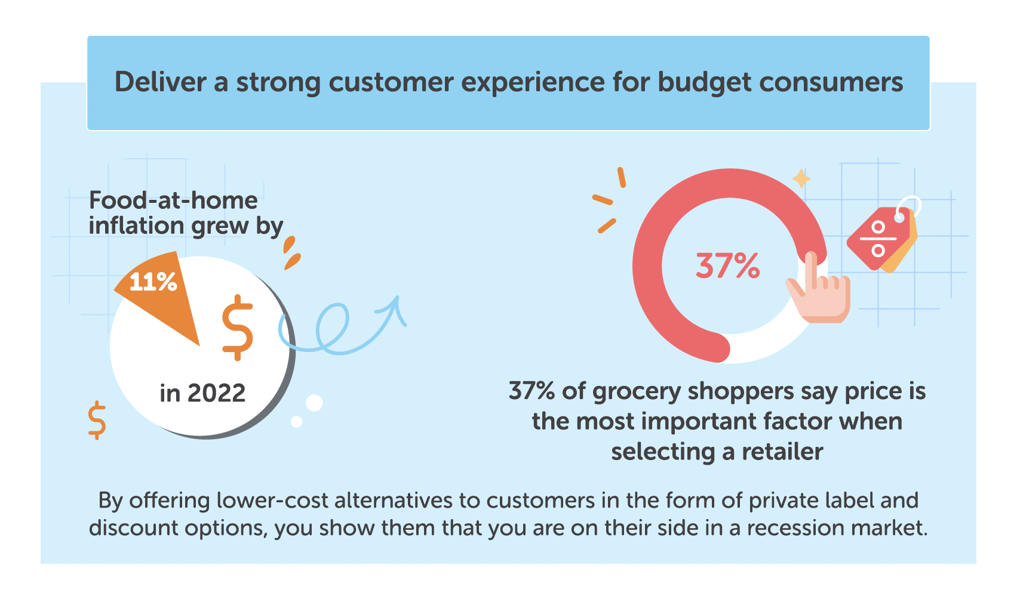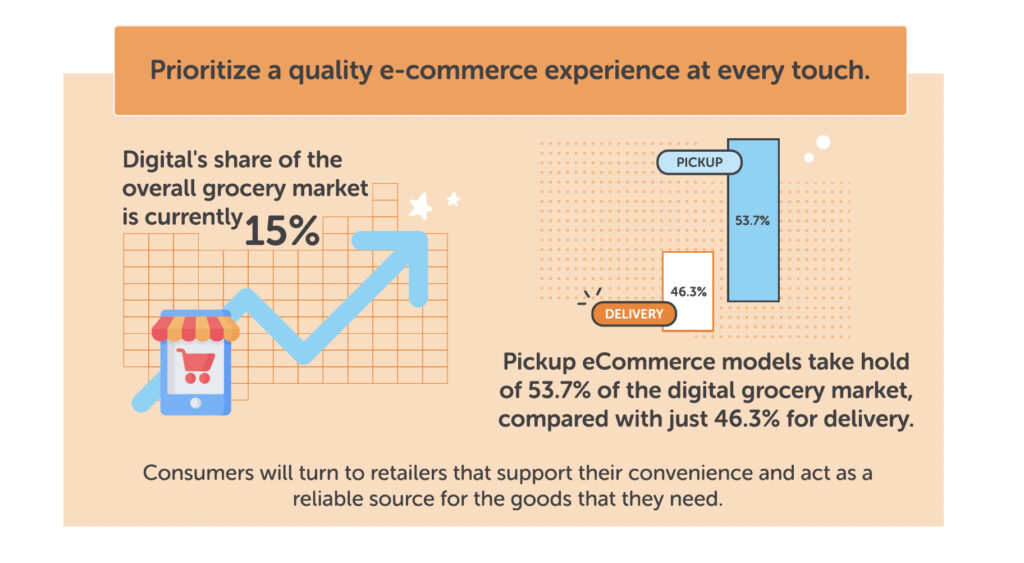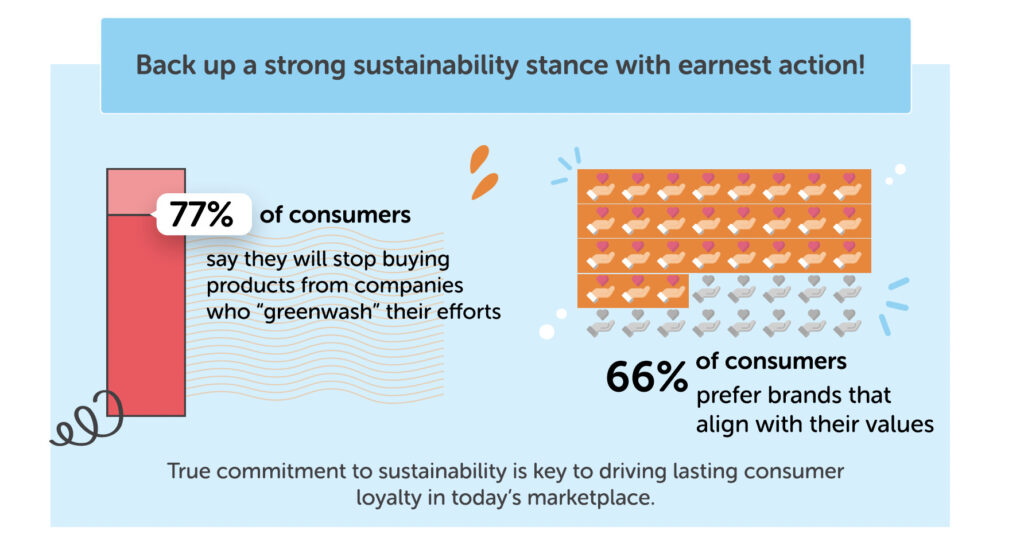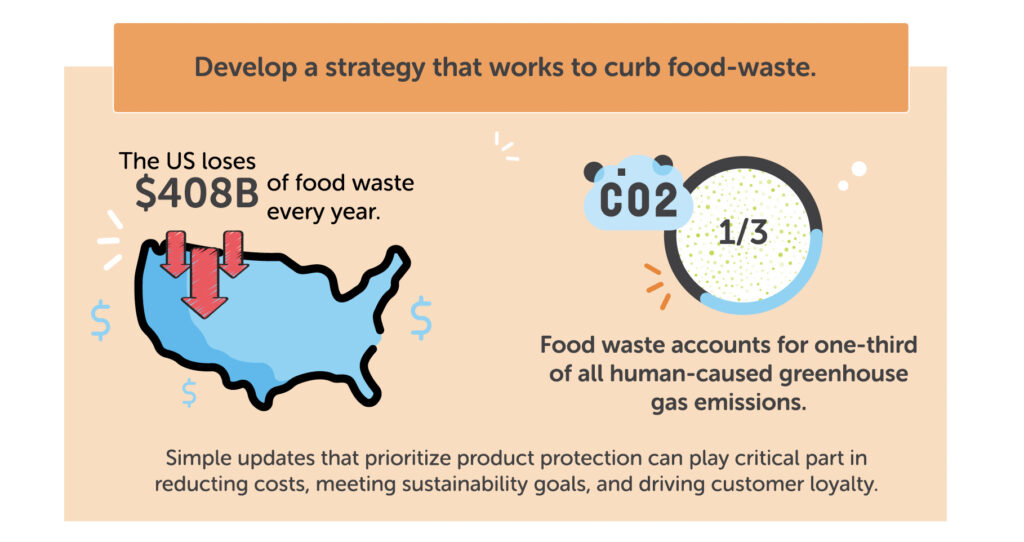The 2023 recession is here and impacting grocery retailers: Now what?
The market has shifted again, driving us all into a recession economy, causing concern for grocery retailers. While it has been threatening this for months, there are many reasons to believe that the predicted recession is already here. This change comes after months of discussion and the path to come out on the other side as a healthy business is clear: align with consumer desires and deliver an unbeatable customer experience.
In this article, we outline four key opportunities for grocery retailers to react in a way that will secure their business, drive consumer loyalty, and more sales.
1. Drive loyalty by offering budget customers savings opportunities
As the recession draws near and consumers begin to feel the effects, customer food spending will shift to lower-cost options. On one hand, this is good news for grocery retailers as uncertain economies tend to draw consumer spending away from restaurants and toward grocery retail.
However, people aren’t happy about facing yet another uncertain economy, and they are watching inflation impact the prices of their everyday products every time they set foot in your stores.

With the Bureau of Labor Statistics reporting a 10.9 percent increase in at-home food prices from October 2021 to October 2022, the impact of everyday food prices going up is going to affect customer relationships with the retailers they have turned to in the past.
One way to counteract this erosion of the relationship is to offer lower-cost alternatives to customers in the form of private label and discount options. Walmart, for example, has been absorbing some of the cost of inflation in order to offer lower prices within their private label sectors and build customer loyalty.
While smaller retailers may not have the ability to manage customer loyalty in this specific way, the fact that CPG categories in general have been experiencing some of the steepest rates of inflation in food means that cheaper, private-label goods are going to be alternatives that consumers naturally reach for, even if they inflate alongside more expensive name-brands. This means that an investment in private label and discount option is a solid bet for grocery retailers.
What you can do:
- Offer lower-cost alternatives to customers in the form of private label and discount options.
- Invest in the long-term and build customer loyalty by absorbing some of the cost of inflation. This enables you to offer lower prices within private label sectors, support smoother operations, and more.
- Make it easier for your customers to save. Promote private label and discount options with clear signage and end-cap space.
2. Ensure your e-commerce experience is strong all the way through
One notable difference for grocery retailers between this recession economy and others in the past is that e-commerce not only exists, but it is an ever-growing piece of grocery shopping.
In fact, according to Progressive Grocer, digital shares nearly 15% of of the overall grocery market in October 2022. While the takeover of digital has been anticipated for years, the explosive growth and adoption it has experienced since 2020 is one of the many impacts of the COVID-19 pandemic.
Even in the face of a recession, the adoption of digital is not likely to slow down.

Because of this, customers will be making decisions about what and where to shop based on online experiences and online storefront functioning.
This means every UX decision needs to make sense. Because nothing is more frustrating for the e-commerce shopper than getting out of stock messages, it also means that ensuring the availability of products is critical.
A strong supply chain that reduces damage to products and prioritizes speed is going to be instrumental in this goal.
What you can do:
- Focus on the speed and ease of use within your e-commerce storefront. For the e-commerce shopper, quickly finding and selecting items is critical to their experience.
- Make sure to list all relevant product information, including availability, up front. Nothing is more frustrating for the e-commerce shopper than getting out-of-stock messages or receiving an order with missing items.
- Ensure the availability of products by auditing your supply chain for places where damage to products and bottlenecks are occurring.
3. A strong sustainability stance and earnest action is key to driving lasting consumer loyalty to grocery retailers
In another clear difference between this season’s recession and recessions in the past is the overwhelming consumer interest in corporate responsibility and sustainability. This is nothing new, of course, but consumers continue to grow savvier about meaningless claims and greenwashing.
NielsenIQ reports that 77% of consumers said they would stop buying products from a company deemed to be “greenwashing” its efforts. In other words, if only for the sake of consumer loyalty, sustainability initiatives with measurable impacts are no longer an option and need to be prioritized.

What you can do:
- Commit to goals that align with a reduction of waste, emissions, and corporate responsibility.
- Ensure those goals are impactful and measurable. Platitudes and well-wishes are no longer convincing to customers, nor will they hesitate to hold businesses accountable.
- Make real changes in your operations and showcase them for the customer to see. When you commit to boosting a stronger recycling program, using electric vehicles, limiting water waste, and more, make sure you customer knows about it.
- Adopting reusable primary and secondary packaging in support of the circular economy is one key step that can revolutionize so many processes in your supply chain.
4. Curbing food-waste as a critical part of your revenue saving and sustainability strategy
We all know food waste is terrible for the environment, but how bad is it really? Well, according to United Nations News, food waste accounts for one-third of all human-caused greenhouse gas emissions. This includes food lost anywhere in the supply chain from harvest to the fridges of well-meaning consumers.
Beyond the catastrophic effect it is having on the environment, it is likely to be damaging your bottom line as well. Due to food shortages around the world that are predicted to continue well into 2023, every ounce of product counts, and its protection is critical to your success.
Russia and Ukraine, two nations that account for 20% of the world’s grain production, have been at war for the better part of 2022, a tragedy that shows no sign of slowing and is likely to continue to seriously affect the availability of grain. Of course, this will affect the production of bread, cereals, and CPG products, but the fact is that most grain isn’t even eaten by humans.
The scarcity of grain generates a shortage of food for animals and ethanol, wreaking havoc on food systems at large.

The nature of food waste is that it has many causes and everyone is at fault. Similar to reducing material waste, the solution to the problem lies in many changes that together make an impact. More protective packaging, better systems in warehouses, donating unmarketable food, and more will all work together to help with food waste.
What you can do:
- Align with supplier partners that are transparent about freshness, origin, and the measures they take to protect products.
- Ensure staff is fully trained on food waste, expiration, and cold chain practices.
- Integrate food traceability technology in your supply chain to identify waste patterns and mitigate them as soon as possible.
- Donate surplus food to charities or partner with local restaurants to ensure any potential waste is given another opportunity to be used.
- Adopt more protective packaging to eliminate damage throughout your supply chain, distribution center handling, and in-retail handling.
How Can Tosca Help?
Efficiency, sustainability, and protection of potentially scarce products are all things retailers should be looking to gain in all economies, especially one that is staring down a recession. With one switch to Tosca’s reusable plastic crates, retailers gain a strong partner and tool to help them achieve those strategies.
Tosca provides reusable plastic packaging and pooling solutions to the leading retailers in all main perishable categories in North America. Our large network of wash sites ensure that crates are cleaned to the highest standard. With 60+ years of experience delivering quality service and reusables to customers in the food industry, Tosca has been making tough times easier for generations of customers.


